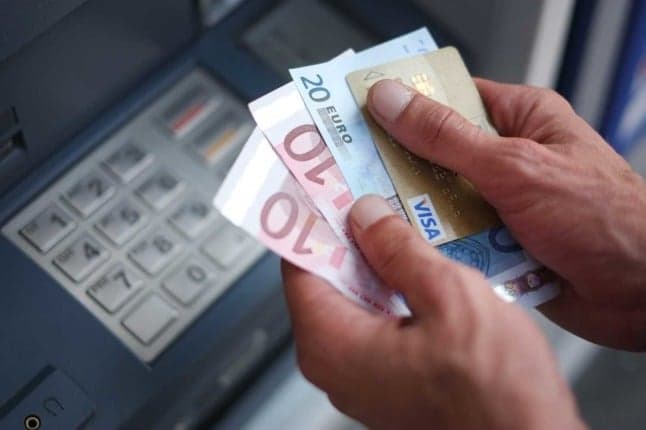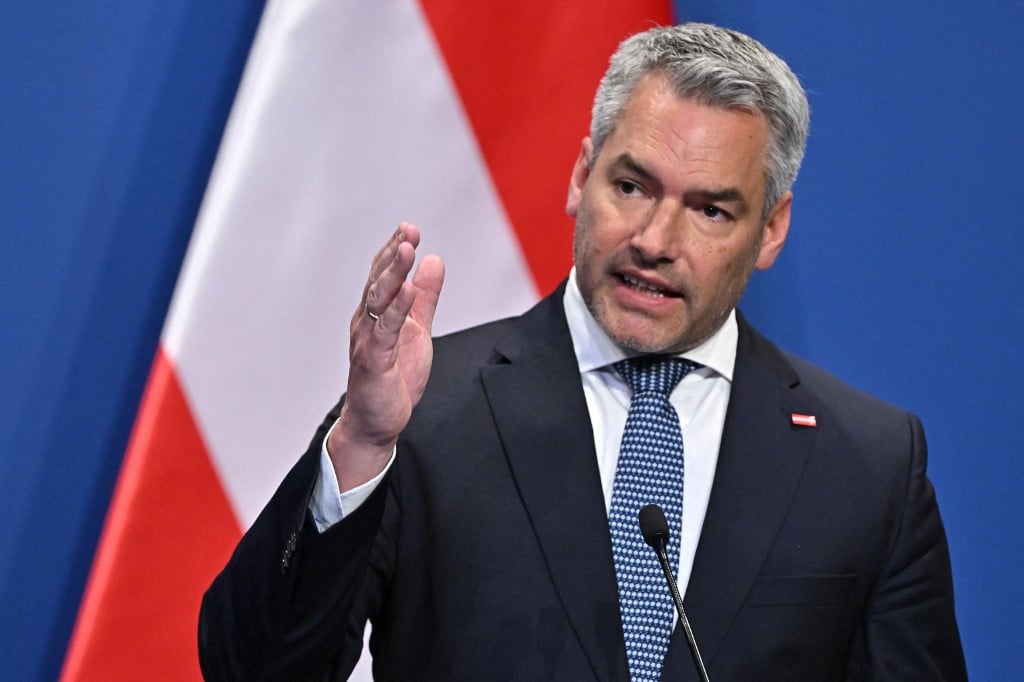Why is Austria so set on making cash payments a constitutional right?

The Austrian government is moving forward with plans to guarantee the right of people in Austria to pay by cash in the constitution, but the EU says it’s not sure what the point is. What's going on?
What's happening?
It may sound a little hard to believe, but one of the top agenda items for the Austrian government in recent weeks has everything to do with Bargeld. Yes, you read that right - Austria is focusing on cash, and it wants to make paying with banknotes and coins a constitutional right.
Chancellor Karl Nehammer, of the conservative Austrian People's Party (ÖVP), announced last week that he wants to go forward with a constitutional cash plan.
“We understand that cash is a very important theme to people,” Nehammer said Thursday. “It’s important to me that cash use is constitutionally guaranteed.”
This week, Constitutional Minister Karoline Edtstadler followed that up by saying that plans are already underway to make the amendment and pass associated laws that would uphold the new constitutional measure.
“It is now important to work out the specific legal framework,” she said, while also hinting that card users should still benefit from more modern payment methods.
“Everyone should be able to decide freely and anonymously how they pay.”
READ ALSO: Cash in Austria to become a constitutional right, vows chancellor
Why is this so important to Austria?
About 70 percent of transactions performed in Austria are still made in cash – one of the highest rates in the Eurozone. That's a higher rate even than neighbouring and fellow German-speaking Germany - which also has the reputation of a cash-obsessed country - 62 percent of transactions there are still performed in cash.
But Austria handily wins the cash count when it comes to ATM availability. While German has about 66 ATMs per 100,000 people, Austria has 97. People in the country also withdraw about €47 billion in cash from those ATMs every year.
 Austrian Chancellor Karl Nehammer, who wants to guarantee a right to cash payment in the Austrian constitution. But the EU says European law already guarantees this. (Photo by ATTILA KISBENEDEK / AFP)
Austrian Chancellor Karl Nehammer, who wants to guarantee a right to cash payment in the Austrian constitution. But the EU says European law already guarantees this. (Photo by ATTILA KISBENEDEK / AFP)
A big reason for this comes down to another cultural obsession - privacy.
According to one survey by payment platform Paysafe, over half of Austrians do not like to give over any data while paying.
READ ALSO: Why is cash so important to Austrians?
Politically, the issue of cash has come up again too.
Austrian politicians have tried to constitutionally guarantee cash before in 2019. That measure failed, but since the Covid-19 pandemic made digital payments a lot more common, politicians think now may be the time to act to preserve cash.
The far-right Freedom Party (FPÖ) has previously called for a referendum on enshrining cash as a protected means of payment into the constitution, while the Social Democrats (SPÖ) want a law passed guaranteeing an ATM in every community.
What's the reaction from the EU?
Austria is a member of the Eurozone, which is governed by international treaties and European law rather than national law.
That's a big reason why the European Commission’s representative in Austria, Martin Selmayr, says he doesn’t see the point of constitutional protection, saying it "won’t add much".
That's because European law, which governs monetary policy and the euro, already guarantees cash as legal tender - meaning that people in Austria already have the right to have it accepted when paying. In Selmayr's view, the government can pass a constitutional amendment to guarantee it but it will mostly be for show.
What happens next?
A constitutional amendment in Austria requires a two-thirds majority to pass.
That means that both government parties - the ÖVP and the Greens - would need to be on the same page about it. The Chancellor is from the ÖVP but the Greens have yet to weigh in substantively.
If the entire government is onside, the government will still need support from either the far-right Freedom Party (FPÖ) or the centre-left Social Democrats (SPÖ) to pass the measure - meaning the one or both of them could push for more concessions.
Even if the amendment passes, the government will have to pass laws that uphold it, and it's not clear what those are supposed to be. Although the SPÖ want a law passed guaranteeing an ATM in every community, the Chancellor says such a request is "unrealistic" - so it remains to be seen how such an amendment would work in practice.
Comments
See Also
What's happening?
It may sound a little hard to believe, but one of the top agenda items for the Austrian government in recent weeks has everything to do with Bargeld. Yes, you read that right - Austria is focusing on cash, and it wants to make paying with banknotes and coins a constitutional right.
Chancellor Karl Nehammer, of the conservative Austrian People's Party (ÖVP), announced last week that he wants to go forward with a constitutional cash plan.
“We understand that cash is a very important theme to people,” Nehammer said Thursday. “It’s important to me that cash use is constitutionally guaranteed.”
This week, Constitutional Minister Karoline Edtstadler followed that up by saying that plans are already underway to make the amendment and pass associated laws that would uphold the new constitutional measure.
“It is now important to work out the specific legal framework,” she said, while also hinting that card users should still benefit from more modern payment methods.
“Everyone should be able to decide freely and anonymously how they pay.”
READ ALSO: Cash in Austria to become a constitutional right, vows chancellor
Why is this so important to Austria?
About 70 percent of transactions performed in Austria are still made in cash – one of the highest rates in the Eurozone. That's a higher rate even than neighbouring and fellow German-speaking Germany - which also has the reputation of a cash-obsessed country - 62 percent of transactions there are still performed in cash.
But Austria handily wins the cash count when it comes to ATM availability. While German has about 66 ATMs per 100,000 people, Austria has 97. People in the country also withdraw about €47 billion in cash from those ATMs every year.

A big reason for this comes down to another cultural obsession - privacy.
According to one survey by payment platform Paysafe, over half of Austrians do not like to give over any data while paying.
READ ALSO: Why is cash so important to Austrians?
Politically, the issue of cash has come up again too.
Austrian politicians have tried to constitutionally guarantee cash before in 2019. That measure failed, but since the Covid-19 pandemic made digital payments a lot more common, politicians think now may be the time to act to preserve cash.
The far-right Freedom Party (FPÖ) has previously called for a referendum on enshrining cash as a protected means of payment into the constitution, while the Social Democrats (SPÖ) want a law passed guaranteeing an ATM in every community.
What's the reaction from the EU?
Austria is a member of the Eurozone, which is governed by international treaties and European law rather than national law.
That's a big reason why the European Commission’s representative in Austria, Martin Selmayr, says he doesn’t see the point of constitutional protection, saying it "won’t add much".
That's because European law, which governs monetary policy and the euro, already guarantees cash as legal tender - meaning that people in Austria already have the right to have it accepted when paying. In Selmayr's view, the government can pass a constitutional amendment to guarantee it but it will mostly be for show.
What happens next?
A constitutional amendment in Austria requires a two-thirds majority to pass.
That means that both government parties - the ÖVP and the Greens - would need to be on the same page about it. The Chancellor is from the ÖVP but the Greens have yet to weigh in substantively.
If the entire government is onside, the government will still need support from either the far-right Freedom Party (FPÖ) or the centre-left Social Democrats (SPÖ) to pass the measure - meaning the one or both of them could push for more concessions.
Even if the amendment passes, the government will have to pass laws that uphold it, and it's not clear what those are supposed to be. Although the SPÖ want a law passed guaranteeing an ATM in every community, the Chancellor says such a request is "unrealistic" - so it remains to be seen how such an amendment would work in practice.
Join the conversation in our comments section below. Share your own views and experience and if you have a question or suggestion for our journalists then email us at [email protected].
Please keep comments civil, constructive and on topic – and make sure to read our terms of use before getting involved.
Please log in here to leave a comment.